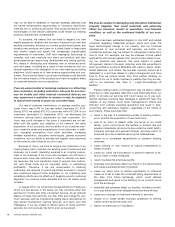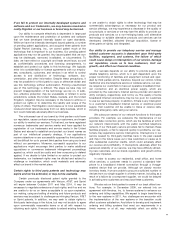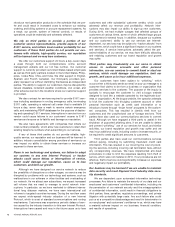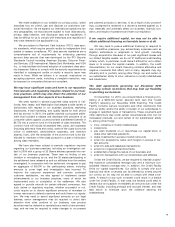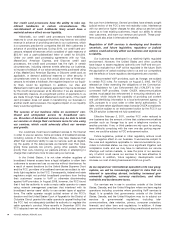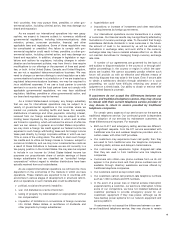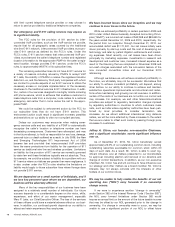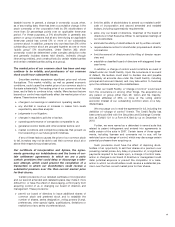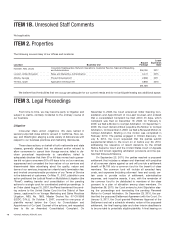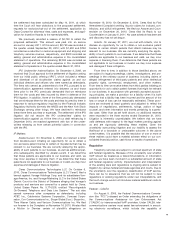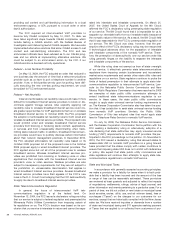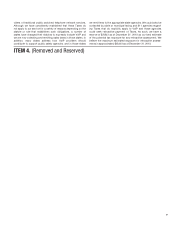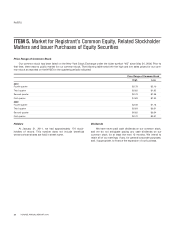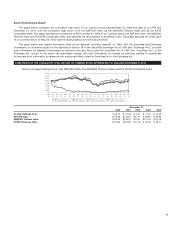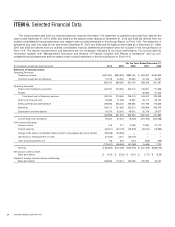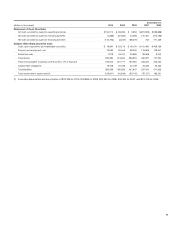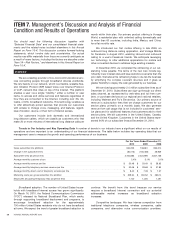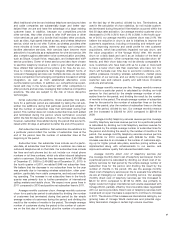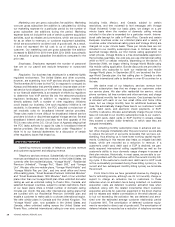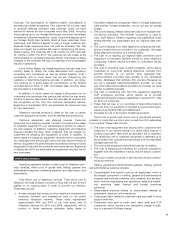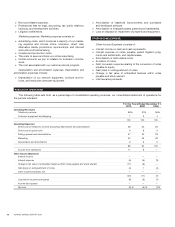Vonage 2010 Annual Report Download - page 27
Download and view the complete annual report
Please find page 27 of the 2010 Vonage annual report below. You can navigate through the pages in the report by either clicking on the pages listed below, or by using the keyword search tool below to find specific information within the annual report.p
roviding call content and call-identifying information to a loca
l
enforcement a
g
ency, or LEA, pursuant to a court order or othe
r
l
a
wf
u
l
au
th
o
riz
a
ti
o
n.
T
he F
CC
required all interconnected VoIP providers t
o
b
ecome full
yC
ALEA compliant b
y
Ma
y
14, 2007. To date, we
have taken significant steps towards
C
ALEA compliance, whic
h
include testing a
C
ALEA solution with the Federal Bureau of
Investigation and delivering lawful
C
ALEA requests. We have als
o
im
p
lemented alternative solutions that allow
C
ALEA access to call
content and call-identifyin
g
information. The F
CC
and law
enforcement officials have been advised as to our
C
ALEA pro
g
-
r
ess and our efforts at implementin
g
alternative solutions. W
e
could be subject to an enforcement action by the F
CC
if our
C
ALEA solution is deemed not fully operational.
F
e
d
era
l
–
L
oca
lN
um
b
er
P
orta
bili
t
y
O
nMa
y
13, 2009, the F
CC
adopted an order that reduced t
o
one business da
y
the amount of time that a telecommunications
p
rov
id
er suc
h
as us
h
ave to port a te
l
ep
h
one num
b
er to anot
h
e
r
p
rovider. If we, or third parties we rely upon for porting, have diffi-
cu
l
ty execut
i
ng t
h
e new one-
d
ay port
i
ng requ
i
rement, we cou
ld
b
e subject to F
CC
enforcement action
.
Federal – Net Neutralit
y
C
lear and enforceable net neutrality rules would make it mor
e
di
ff
icult
f
or broadband Internet service
p
roviders to block or dis
-
criminate a
g
ainst Vona
g
e service. Also explicitly applyin
g
ne
t
neutrality rules to wireless broadband Internet service could cre
-
ate
g
reater opportunities
f
or VoIP applications that run on wireles
s
b
roadband Internet service. In October 2009, the FCC
p
ro
p
ose
d
t
he adoption o
f
en
f
orceable net neutrality rules
f
or both wired an
d
w
i
re
l
ess
b
roa
db
an
dI
nternet serv
i
ce
p
rov
id
ers.
Th
e
p
ro
p
ose
d
ru
l
es
wou
ld p
ro
hibi
tw
i
re
d
an
d
w
i
re
l
ess
b
roa
db
an
dI
nternet serv
i
c
e
p
roviders
f
rom blockin
g
or hinderin
g
law
f
ul content, applications
,
or services and
f
rom unreasonably discriminating when trans
-
mitting law
f
ul network tra
ff
ic. In addition, broadband Internet serv-
i
ce providers would have to publicl
y
disclose certain in
f
ormatio
n
a
b
out t
h
e
i
r networ
k
management pract
i
ces.
I
n
D
ecem
b
er 2010,
t
he FCC adopted enforceable net neutralit
y
rules based on it
s
O
ctober 2009 proposal. All of the proposed rules in the
O
ctober
2009 proposa
l
app
ly
to w
i
re
db
roa
db
an
dI
nternet prov
id
ers.
The
F
CC
applied some but not all of the proposed rules to wireles
s
b
roa
db
an
d
serv
i
ce.
Wi
re
l
ess
b
roa
db
an
dI
nternet serv
i
ces pro-
v
iders are prohibited from blocking or hindering voice or vide
o
app
li
cat
i
ons t
h
at compete w
i
t
h
t
h
e
b
roa
db
an
dI
nternet serv
i
ce
p
rov
id
er
’
svo
i
ce or v
id
eo serv
i
ces.
Wi
re
l
ess prov
id
ers are a
l
s
o
s
u
bj
ect to transparenc
y
requ
i
rements,
b
ut t
h
e
y
are not su
bj
ect to
th
e pro
hibi
t
i
on on unreasona
bl
e
di
scr
i
m
i
nat
i
on t
h
at app
li
es t
o
wired broadband Internet services providers.
S
everal broadband
Internet service providers have filed appeals of the F
CC
’s ne
w
r
ules in the D.
C
.
C
ircuit
C
ourt alleging that the F
CC
lacks authorit
y
t
o app
ly i
ts ru
l
es to
b
roa
db
an
dI
nternet serv
i
ce prov
id
ers
.
S
tate Telecommunications Regulation
In
g
eneral, the focus of interconnected VoIP tele
-
communications re
g
ulation is at the federal level.
On
November 12, 2004, the F
CC
issued a declaratory rulin
g
providin
g
t
hat our service is subject to federal re
g
ulation and preempted the
M
innesota Public Utilities
C
ommission from imposin
g
certain of
i
ts re
g
ulations on us. The F
CC
’s decision was based on its con
-
clusion that our service is interstate in nature and cannot be se
p
a-
r
ated into interstate and intrastate com
p
onents.
O
n March 21
,
2007, the United
S
tates
C
ourt of A
pp
eals for the 8th
C
ircui
t
affirmed the F
CC
’s declaratory rulin
g
preemptin
g
state re
g
ulation
of our service. The 8th
C
ircuit found that it is im
p
ossible for us t
o
s
e
p
arate our interstate tra
ff
ic
f
rom our intrastate tra
ff
ic because o
f
t
he nomadic nature of the service. As a result, the 8th
C
ircuit held
t
hat it was reasonable for the F
CC
to preempt state re
g
ulation o
f
our service. The 8th Circuit was clear, however, that the
p
re-
emptive effect of the FCC’s declaratory rulin
g
may be reexamined
if
technolo
g
ical advances allow
f
or the separation o
f
interstat
e
and intrastate com
p
onents o
f
the nomadic VoIP service. There
-
f
ore, the preemption o
f
state authority over our service under this
r
ulin
gg
enerally hin
g
es on the inability to separate the interstat
e
and intrastate com
p
onents o
f
the service
.
W
hile this rulin
g
does not exempt us
f
rom all state oversi
g
ht
o
f
our service, it e
ff
ectively prevents state telecommunication
s
r
e
g
ulators
f
rom imposin
g
certain burdensome and inconsistent
market entry requirements and certain other state utility rules an
d
r
e
g
ulations on our service. State re
g
ulators continue to probe th
e
l
imits o
ff
ederal preemption in their attempts to apply state tele
-
communications re
g
ulation to interconnected VoIP service. Law-
s
uits by the Nebraska Public Service Commission and New
M
exico Public Re
g
ulatory Commission that were resolved in 200
9
are examples o
f
state public utility commission attempts t
o
extend traditional state telecommunications re
g
ulation to ou
r
s
ervice. In these cases, the state public utility commission
s
s
ou
g
ht to apply state universal service
f
undin
g
requirements to
us. The Kansas Cor
p
oration Commission also has taken the
p
osi
-
t
ion that it has jurisdiction to seek state universal service
f
undin
g
from nomadic VoIP providers. Similarl
y
, the Public Utilit
y
C
ommission of Ohio has adopted rules that would appl
y
stat
e
fees for Telephone Rela
y
Service to nomadic VoIP service.
O
n July 16, 2009, the Nebraska Public Service Commission
and the Kansas Cor
p
oration Commission filed a
p
etition with th
e
FCC seekin
g
a declaratory rulin
g
or, alternatively, adoption of
a
r
u
l
e
d
ec
l
ar
i
ng t
h
at state aut
h
or
i
t
i
es may app
l
yun
i
versa
l
serv
i
c
e
funding (“USF”) requirements to nomadic VoIP providers. We par-
t
icipated in the FCC proceedings on the petition. On November 5,
2010, the FCC issued a declaratory ruling that allowed states t
o
assess state USF on nomadic VoIP providers on a going forwar
d
b
as
i
s prov
id
e
d
t
h
at t
h
e states comp
ly
w
i
t
h
certa
i
n con
di
t
i
ons t
o
ensure that imposing state U
S
F does not conflict with federal law
or po
li
c
y
.
W
e expect t
h
at state pu
bli
cut
ili
t
y
comm
i
ss
i
ons an
d
s
tate
l
eg
i
s
l
ators w
ill
cont
i
nue t
h
e
i
r attempts to app
l
y state te
l
e-
commun
i
cat
i
ons regu
l
at
i
ons to noma
di
c
V
o
IP
serv
i
ce
.
S
tate and Munici
p
al Taxe
s
In accordance with
g
enerally accepted accountin
g
principles
,
we make a provision
f
or a liability
f
or taxes when it is both prob
-
able that a liability has been incurred and the amount o
f
the los
s
or ran
g
eo
f
loss can be reasonably estimated. These provision
s
are reviewed at least quarterly and adjusted to re
f
lect the impact
s
o
f
ne
g
otiations, settlements, rulin
g
s, advice o
f
le
g
al counsel, an
d
other in
f
ormation and events pertainin
g
to a particular case. For a
p
eriod o
f
time, we did not collect or remit state or munici
p
al taxe
s
(such as sales, excise, utility, use, and ad valorem taxes), fees o
r
s
urchar
g
es (“Taxes”) on the char
g
es to our customers for our
s
erv
i
ces, except t
h
at we
hi
stor
i
ca
ll
y comp
li
e
d
w
i
t
h
t
h
e
N
ew
J
erse
y
s
ales tax. We have received in
q
uiries or demands
f
rom a numbe
r
o
f
state and municipal taxin
g
and 911 a
g
encies seekin
g
payment
o
f
Taxes that are applied to or collected
f
rom customers o
f
pro
-
2
0
VO
NA
G
E ANN
U
AL REP
O
RT 2010


